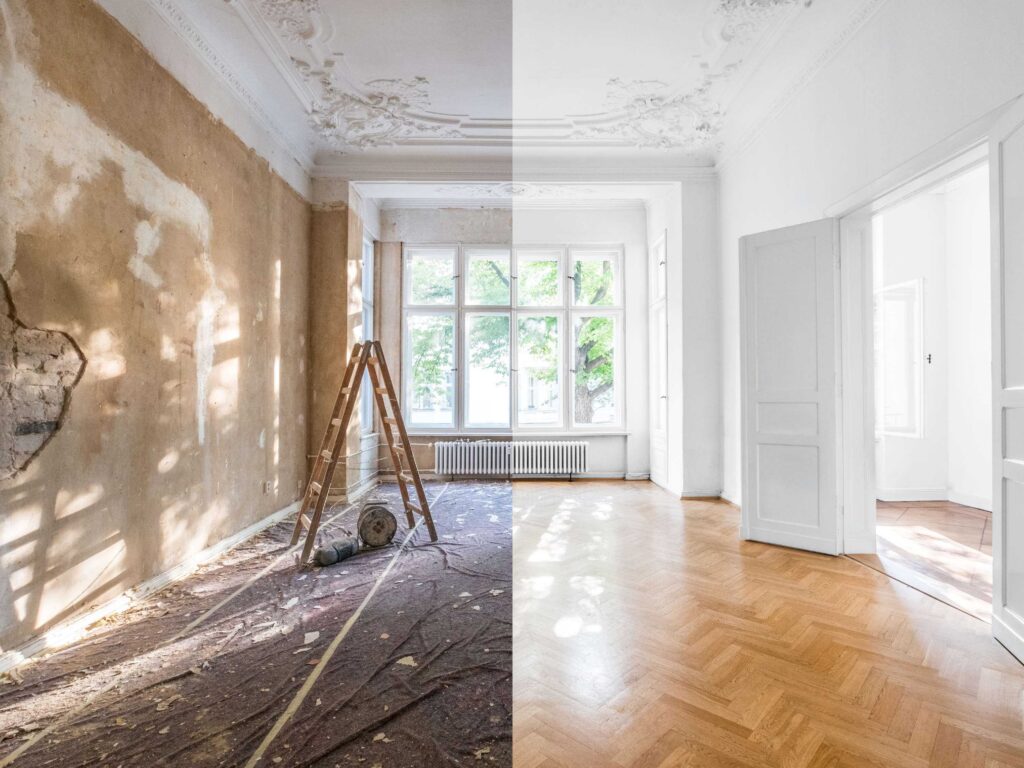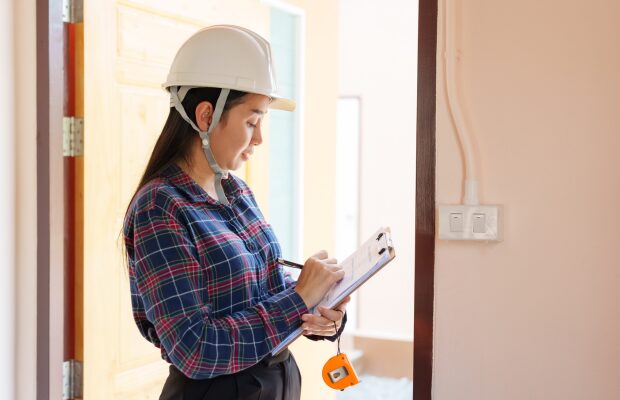Buying a property is all about choice and one of those choices could be whether to buy a new-build home or a doer-upper.
This guide reveals the pros and cons for both…
What is a doer-upper?
A doer-upper, or ‘fixer-upper’, is a name for a property that needs repair and renovation.
The level of work a doer-upper needs will vary from overall cosmetic improvements and decoration to general renovation work or major structural improvement.
Is it worth buying a doer-upper?
Taking on a major property renovation can be hugely exciting and there are lots of potential benefits, too…
1. You might pay less for a run-down property
Properties in need of major work are often cheaper to buy, so you may be able to find a genuine bargain.
2. You may be able to buy in a more expensive area
Because doer-uppers are generally cheaper than ‘move straight in’ properties, you may be able to buy in an area that would otherwise be financially out of reach.
3. You can add value
By renovating in the right way and staying on top of your budget, you should be able to add value to your property – either for an immediate sale or when you come to sell it in the future.
4. You can make the property your own
One of the biggest benefits of buying a doer-upper to live in is being able to add your own stamp on the property and make it work for you.
What you’ll need to consider before buying a doer-upper
While the prospect of taking on a property project can be exciting and a real opportunity to put your stamp on your home as well as add value, there are also plenty of things to consider:
1. Renovation work can be expensive
Depending on the level of work you want to carry out, renovations can require extremely deep pockets.
You’ll also need to stay on top of your budget if you want to maximise the value you’re able to add.
2. Doer-uppers can throw up unexpected surprises
Properties in need of major repairs will almost certainly have been neglected in the past – and this can mean they often produce expensive surprises that test your budget.
3. You may have to live somewhere else while work is carried out
It can be difficult, or even impossible, to live in a property while work is completed.
So, if you have to rent a property for a period of time, this can become expensive.
4. You’ll need patience
Renovation work takes time and there are often hurdles to overcome for tradespeople, which can be frustrating when you are desperate to move in!
Top tips for buying a doer-upper
- Set your budget for both your purchase and the renovation work – and stick to it
- Think carefully about location and stick to the adage ‘the worst house in the best street’ when looking at doer-uppers to buy
- Always have a full structural survey carried out
- Speak to your local planning department in advance if you’re looking to extend
- Get advice from your local agent on what buyers look for from properties in the area so you can think long-term with the work you have carried out
How do I find a fixer-upper?
The best place to start when looking for a fixer-upper to buy is your local estate agent.
It’s worth remembering that this kind of property doesn’t always have to be a wreck – a good fixer-upper is one that needs updating, but also offers the potential to add additional space.
Other places to look for development opportunities include:
Solicitors, who may have probate properties for sale
Property auctions
Financing a doer-upper
While you might be able to buy most doer-uppers with a mortgage, those in a more severe state of disrepair might be deemed ‘uninhabitable’ by lenders.
If so, you may be limited to buying with cash or through development finance, which can be more complex and more expensive than a traditional mortgage.
Is buying a new-build a good investment?
Buying a new build home can be a great long-term investment, and new builds do come with several other positives…
1. You’re buying a chain-free home
When you buy an existing property, there’s a chance you could end up in a long sales chain.
This can mean delays and sometimes even the collapse of the chain, meaning you lose your property.
When buying a new build, you’re the only purchaser, meaning the process is less risky and often much faster.
2. You could use a government scheme
The government has two major home buying schemes in place to help first-time buyers on to the property ladder.
Help to Buy is only available on new build homes, while many properties in the Shared Ownership scheme are also new.
3. You could benefit from incentives
Developers of new build homes will often throw in various incentives to convince you to buy one of their properties.
That could include upgrades on fixtures and fittings, or even covering your stamp duty costs.
4. Better energy efficiency
New build homes often offer better energy efficiency that older or run-down properties, meaning you’ll save money on your bills from day one.
Things to consider before buying a new build
Although buying a new build gives you the opportunity to move straight into a new home, there are also some things you’ll need to consider before committing…
1. Developments can feel congested
Properties on large developments can sometimes feel ‘squeezed in’, meaning space around the home you’re looking to buy may be at a premium.
2. New builds can drop in value early on
New build homes are only ‘new’ once and as soon as you move in, your property
becomes an existing home. That means some new builds can depreciate early on, before rising again in the future.
3. Snagging can be frustrating
It’s a common assumption that buying a new build means you’re buying a ‘perfect’ home.
But even new homes can come with problems and although you’ll be able to undertake ‘snagging’ with your developer, where you highlight things that aren’t right prior to completion, other problems can often crop up once you’ve moved in.
4. New builds can be delayed
New homes can sometimes suffer build delays, meaning if you purchase one before it’s been built, known as buying ‘off plan’, you may have to rent for longer or delay the sale of your current home.
Top tips for buying a new build
- Always negotiate with a developer over the asking price
- New builds work best when you plan to stay for the long term, as they can depreciate early on
- Visit your developer’s other sites and see what people are saying about the quality of their homes and customer service online
- Be firm and thorough with snagging issues
- If buying off plan, ask your developer to put a ‘long stop’ date in your contract – this means if your home isn’t ready by that date, you can seek compensation for extra costs you’ll incur
How to find a new build home
If you’re looking for a new build property to move into or buy as a buy-to-let investment, we’re uniquely placed to help due to our close links with developers across the UK.
Find out more here.








